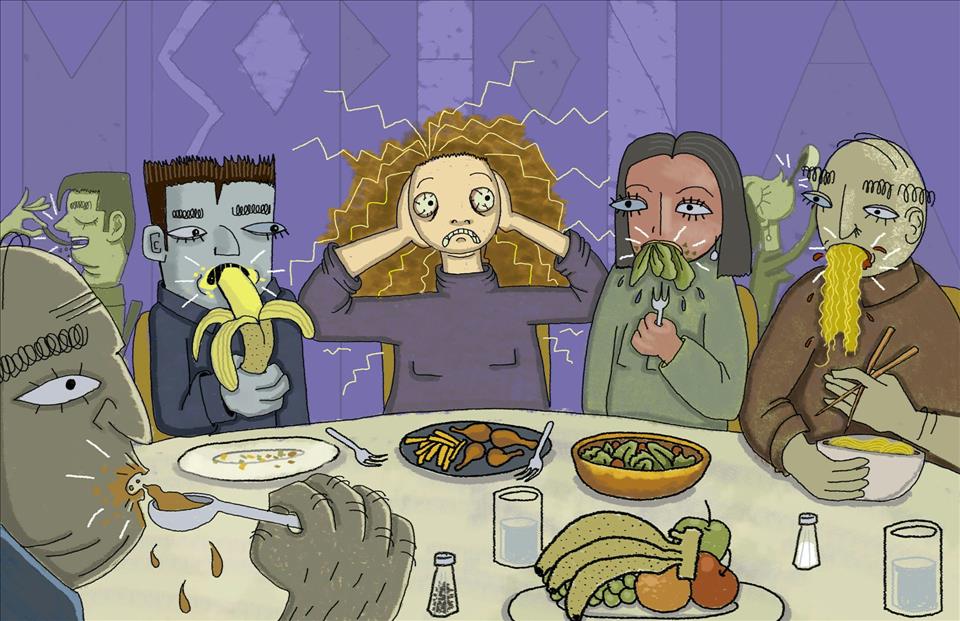
Misophonia: Having Strong Negative Reactions To Certain Sounds Is Linked To Mental Inflexibility
If you've ever felt inexplicably furious at the sound of someone chewing or clicking a pen, you might have some insight into what people with misophonia experience. The triggers can be sounds made by the human body – someone eating crisps, cracking their knuckles, or breathing heavily. But it's not just bodily sounds; a clock ticking or a dog barking can provoke the same intense reaction.
The emotional responses range from irritation to full-blown rage and disgust. These aren't just feelings, either. Physically, people with misophonia experience fight-or-flight responses when they hear trigger sounds. For some, the condition becomes so debilitating that they avoid situations where they might encounter these sounds, which can seriously affect their daily lives and relationships.
But why do certain sounds cause such extreme reactions? The new study suggests that people with misophonia may find it harder to switch focus between emotional and non-emotional information – a skill known as“affective flexibility”.
The researchers tested 140 adults with an average age of 30, including both those with clinically significant misophonia symptoms and those whose symptoms didn't meet clinical thresholds. Participants completed a memory and affective flexibility task , which involved both memory tasks and emotional tasks using pictures rather than sounds.
The participants were asked to switch between remembering details and judging the emotional content of pictures. The researchers found that the severity of someone's misophonia was associated with their ability to accurately respond to emotional tasks. More severe misophonia was associated with worse accuracy on these tasks, suggesting reduced mental flexibility when dealing with emotional stimuli.

A trigger sound could be someone cracking their knuckles. Oporty786/Shutterstock The mind's echo: why some sounds won't let go
Based on questionnaire responses, people with more severe misophonia also showed a stronger tendency to ruminate. Rumination refers to getting stuck in negative thoughts about the past, present, or future, which can cause distress.
It's worth noting that the questionnaires weren't specifically about ruminating on misophonia experiences – this was a general tendency to get stuck in negative thought patterns.
Rumination is a symptom of various mental health conditions, including anxiety, depression and obsessive-compulsive disorder. This link between misophonia and rumination suggests the condition may relate to how people process emotions in general, not just how they react to certain sounds.
These findings highlight just how complex our experiences with sound can be. Hearing really is much more than just the ear doing its job. More severe misophonia may be linked to less mental flexibility around emotional situations and a stronger habit of negative thinking.
It's crucial to understand that these findings reflect correlation, not causation. We can't say that reduced mental flexibility causes misophonia, or that misophonia causes reduced flexibility. The relationship could work either way, or both could be influenced by some other factor entirely. Still, the researchers suggest these findings may help inform how misophonia is diagnosed in future.
There are some limitations to consider. The memory and affective flexibility task is new as of this year, so there's limited data on how well it works. It would also be useful for future research to use sounds instead of images to better understand how visual versus auditory emotional stimuli relate to misophonia. The study also didn't use a control task to compare emotional task switching with non-emotional task switching, which would have strengthened the findings.
Misophonia remains an underexplored area of research. We don't really know how common it is worldwide, and research into treatment is still in early stages . There's even debate about which disorder classification misophonia should be grouped into, if any.
For people with misophonia, the condition can seriously disrupt everyday life. A deeper exploration of the diversity in hearing experiences will be key to understanding how people process sound and how best to relieve the discomfort it brings.

Legal Disclaimer:
MENAFN provides the
information “as is” without warranty of any kind. We do not accept
any responsibility or liability for the accuracy, content, images,
videos, licenses, completeness, legality, or reliability of the information
contained in this article. If you have any complaints or copyright
issues related to this article, kindly contact the provider above.


















Comments
No comment